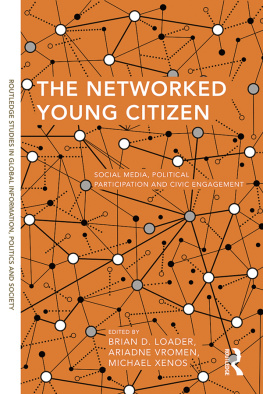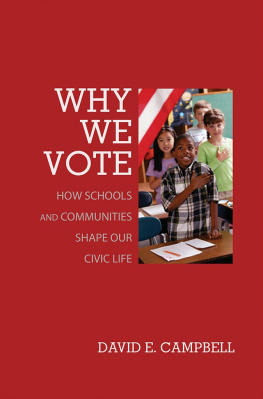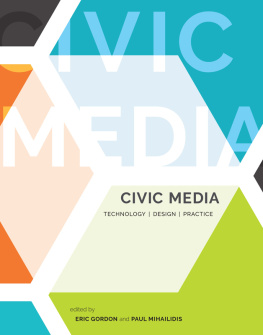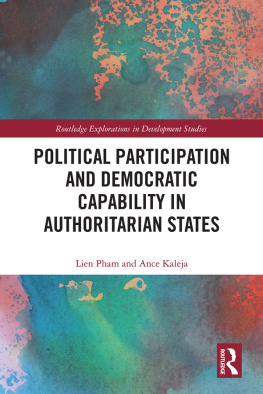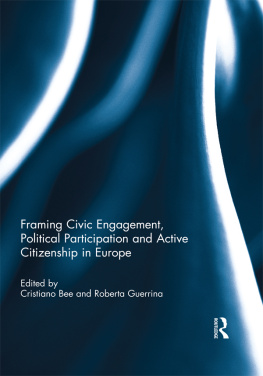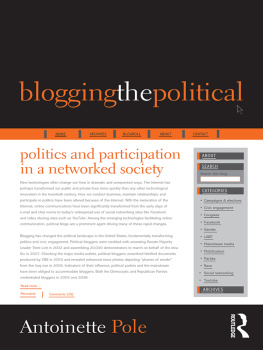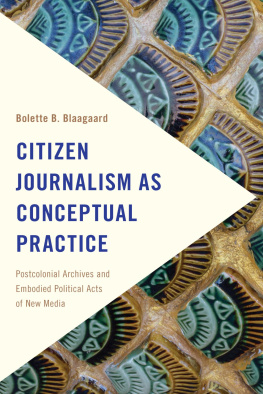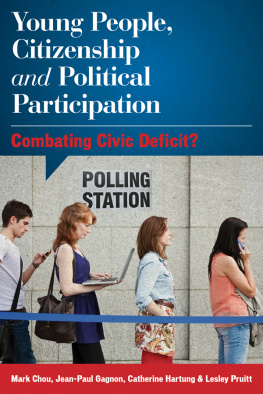Brian D. Loader - The Networked Young Citizen: Social Media, Political Participation and Civic Engagement
Here you can read online Brian D. Loader - The Networked Young Citizen: Social Media, Political Participation and Civic Engagement full text of the book (entire story) in english for free. Download pdf and epub, get meaning, cover and reviews about this ebook. year: 2014, publisher: Routledge, genre: Politics. Description of the work, (preface) as well as reviews are available. Best literature library LitArk.com created for fans of good reading and offers a wide selection of genres:
Romance novel
Science fiction
Adventure
Detective
Science
History
Home and family
Prose
Art
Politics
Computer
Non-fiction
Religion
Business
Children
Humor
Choose a favorite category and find really read worthwhile books. Enjoy immersion in the world of imagination, feel the emotions of the characters or learn something new for yourself, make an fascinating discovery.
- Book:The Networked Young Citizen: Social Media, Political Participation and Civic Engagement
- Author:
- Publisher:Routledge
- Genre:
- Year:2014
- Rating:5 / 5
- Favourites:Add to favourites
- Your mark:
- 100
- 1
- 2
- 3
- 4
- 5
The Networked Young Citizen: Social Media, Political Participation and Civic Engagement: summary, description and annotation
We offer to read an annotation, description, summary or preface (depends on what the author of the book "The Networked Young Citizen: Social Media, Political Participation and Civic Engagement" wrote himself). If you haven't found the necessary information about the book — write in the comments, we will try to find it.
Brian D. Loader: author's other books
Who wrote The Networked Young Citizen: Social Media, Political Participation and Civic Engagement? Find out the surname, the name of the author of the book and a list of all author's works by series.
The Networked Young Citizen: Social Media, Political Participation and Civic Engagement — read online for free the complete book (whole text) full work
Below is the text of the book, divided by pages. System saving the place of the last page read, allows you to conveniently read the book "The Networked Young Citizen: Social Media, Political Participation and Civic Engagement" online for free, without having to search again every time where you left off. Put a bookmark, and you can go to the page where you finished reading at any time.
Font size:
Interval:
Bookmark:
by Routledge
711 Third Avenue, New York, NY 10017
2 Park Square, Milton Park, Abingdon, Oxon OX14 4RN
York, UK), Ariadne Vromen (University of Sydney, Australia) and
Michael Xenos (University of Wisconsin at Madison, USA.
Political activity. 5. InternetPolitical aspects. 6. Political
participationTechnological innovations. 7. Political socialization.
I. Loader, Brian, 1958 , author, editor of compilation. II. Vromen,
Ariadne, author, editor of compilation. III. Xenos, Michael Andrew,
author, editor of compilation.
302.30285dc23
2013049207
ISBN: 978-1-315-77859-4 (ebk)
by Apex CoVantage, LLC
Font size:
Interval:
Bookmark:
Similar books «The Networked Young Citizen: Social Media, Political Participation and Civic Engagement»
Look at similar books to The Networked Young Citizen: Social Media, Political Participation and Civic Engagement. We have selected literature similar in name and meaning in the hope of providing readers with more options to find new, interesting, not yet read works.
Discussion, reviews of the book The Networked Young Citizen: Social Media, Political Participation and Civic Engagement and just readers' own opinions. Leave your comments, write what you think about the work, its meaning or the main characters. Specify what exactly you liked and what you didn't like, and why you think so.

